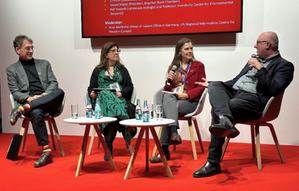 "The top three actions are paper, paper, and shipping," said EJ Hurst, sales manager of Canada's New Society Publishers, during a panel on climate science and climate action at the Frankfurt Book Fair last week.
"The top three actions are paper, paper, and shipping," said EJ Hurst, sales manager of Canada's New Society Publishers, during a panel on climate science and climate action at the Frankfurt Book Fair last week.
Ralf Seppelt, author and professor of landscape ecology and renewable resource economics, and Sevani Matos, president of the Brazilian Book Chamber, rounded out the panel, while author Arne Molfenter moderated.
If publishers switched their paper from virgin forest paper to 100% post-consumer recycled paper, Hurst continued, "you will reduce your emissions by 50%-60%." She cautioned against thinking that forest-certified paper is the answer, as it tends to come from tree farms, and tree farms do nearly nothing for biodiversity.
 |
|
| (from left) Ralf Seppelt, Sevani Matos, EJ Hurst, and Arne Molfenter. | |
She noted that for various reasons, "we can't all everywhere turn to recycled paper," and called for the industry to invest in "next-generation paper alternatives." These alternatives include paper made from "what is currently agricultural waste," such as oat straw in Canada or sugar cane fiber in Brazil. These do not contain wood fiber and do not rely on cutting down trees. Hurst urged large publishers to "enter into offtake agreements" with these alternative paper mills, and said small publishers can join consortiums supporting these mills.
It is also essential, Hurst said, to "make your shipping distances as short as possible." Print-on-demand has "great environmental promise," she remarked, but pointed out that a POD run by itself does not mean a sustainable print run. She recalled an "very unfortunate experience" involving a POD print run that was printed on virgin paper in the U.S. and then "air freighted to Europe." That, she emphasized, "is not the print-on-demand revolution we are seeking," and she told publishers to pay close attention to distribution from those POD printers. "All is not always as it may seem."
Asked about the connection between biodiversity loss and the climate crisis, Seppelt said the "key message" at this point is that the two are so "highly interlinked," that they amount to "one big crisis" to deal with. For example, with higher diversity in agricultural landscapes, farmers can "get along with less energy input" and with less pesticides. And in Germany, forests are "really under pressure," and for the first time have "flipped" from carbon sinks to carbon sources, due to dying trees. It means that "whatever we do to protect the climate" is also "good for biodiversity," and doing "good things for biodiversity" is good for the climate.
Seppelt also brought up the role of publishers in communicating information about the climate crisis, and wondered how best to convey these things to the public. He mentioned a book to which he contributed that theorized what life would look like with a "unfortunate but likely +3 degrees scenario," noting that it was well written "but not really motivating at the end." That book, and many of the others on his bookshelf, were "really doomsday-ish," and he pointed to a lack of narratives that are positive and hopeful without "neglecting what's ahead of us."
Matos reported that the Brazilian Book Chamber has developed a guide about climate change and ESG (environmental, social, and governance), which she said was the first of its kind in South America. It encourages the publishing sector to incorporate sustainable practices in paper consumption and to "minimize material waste." The guide is being distributed to all publishers and book chains in Brazil, with Matos hoping it leads to some productive conversations.
She said there is a "long way to go" in Brazil when it comes to things like paper recycling, but publishers can start "disseminating knowledge" immediately. They can also immediately begin educating their own teams and making sure there is buy-in from their employees.
Hurst further advocated for the switch to "triple bottom-line accounting," which includes impacts to society and the environment. "It's time for people and planet to have a place on the P&L." --Alex Mutter

